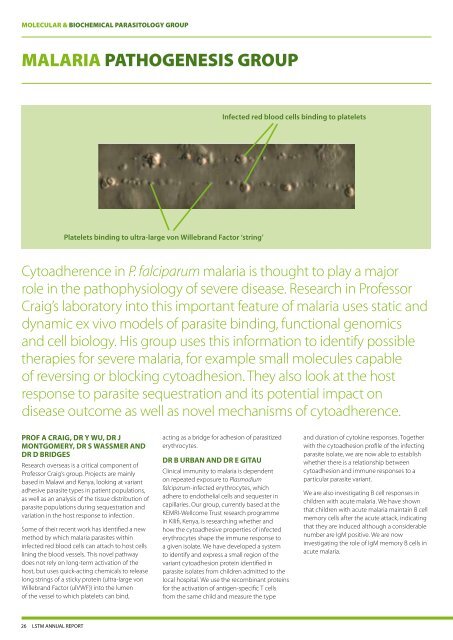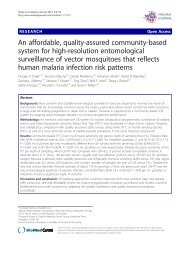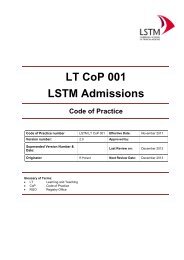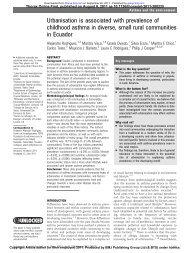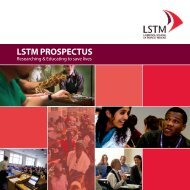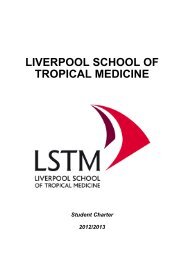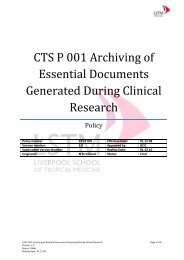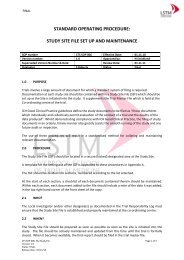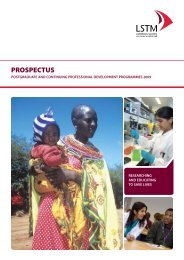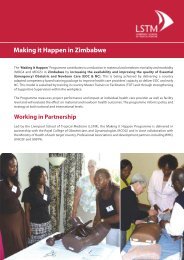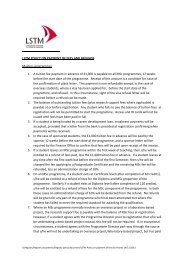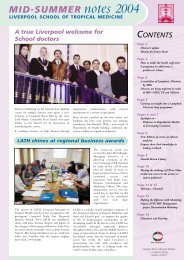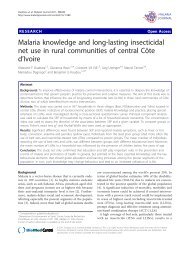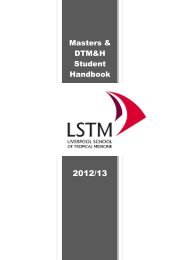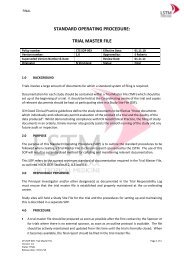Annual Report 2008 - 2009 - Liverpool School of Tropical Medicine
Annual Report 2008 - 2009 - Liverpool School of Tropical Medicine
Annual Report 2008 - 2009 - Liverpool School of Tropical Medicine
You also want an ePaper? Increase the reach of your titles
YUMPU automatically turns print PDFs into web optimized ePapers that Google loves.
MOLECULAR & BIOCHEMICAL PARASITOLOGY GROUP<br />
MALARIA PATHOGENESIS GROUP<br />
Infected red blood cells binding to platelets<br />
Platelets binding to ultra-large von Willebrand Factor ‘string’<br />
Cytoadherence in P. falciparum malaria is thought to play a major<br />
role in the pathophysiology <strong>of</strong> severe disease. Research in Pr<strong>of</strong>essor<br />
Craig’s laboratory into this important feature <strong>of</strong> malaria uses static and<br />
dynamic ex vivo models <strong>of</strong> parasite binding, functional genomics<br />
and cell biology. His group uses this information to identify possible<br />
therapies for severe malaria, for example small molecules capable<br />
<strong>of</strong> reversing or blocking cytoadhesion. They also look at the host<br />
response to parasite sequestration and its potential impact on<br />
disease outcome as well as novel mechanisms <strong>of</strong> cytoadherence.<br />
PROF A CRAIG, DR Y WU, DR J<br />
MONTGOMERY, DR S WASSMER AND<br />
DR D BRIDGES<br />
Research overseas is a critical component <strong>of</strong><br />
Pr<strong>of</strong>essor Craig’s group. Projects are mainly<br />
based in Malawi and Kenya, looking at variant<br />
adhesive parasite types in patient populations,<br />
as well as an analysis <strong>of</strong> the tissue distribution <strong>of</strong><br />
parasite populations during sequestration and<br />
variation in the host response to infection.<br />
Some <strong>of</strong> their recent work has identified a new<br />
method by which malaria parasites within<br />
infected red blood cells can attach to host cells<br />
lining the blood vessels. This novel pathway<br />
does not rely on long-term activation <strong>of</strong> the<br />
host, but uses quick-acting chemicals to release<br />
long strings <strong>of</strong> a sticky protein (ultra-large von<br />
Willebrand Factor (ulVWF)) into the lumen<br />
<strong>of</strong> the vessel to which platelets can bind,<br />
acting as a bridge for adhesion <strong>of</strong> parasitized<br />
erythrocytes.<br />
Dr B Urban and Dr E Gitau<br />
Clinical immunity to malaria is dependent<br />
on repeated exposure to Plasmodium<br />
falciparum-infected erythrocytes, which<br />
adhere to endothelial cells and sequester in<br />
capillaries. Our group, currently based at the<br />
KEMRI-Wellcome Trust research programme<br />
in Kilifi, Kenya, is researching whether and<br />
how the cytoadhesive properties <strong>of</strong> infected<br />
erythrocytes shape the immune response to<br />
a given isolate. We have developed a system<br />
to identify and express a small region <strong>of</strong> the<br />
variant cytoadhesion protein identified in<br />
parasite isolates from children admitted to the<br />
local hospital. We use the recombinant proteins<br />
for the activation <strong>of</strong> antigen-specific T cells<br />
from the same child and measure the type<br />
and duration <strong>of</strong> cytokine responses. Together<br />
with the cytoadhesion pr<strong>of</strong>ile <strong>of</strong> the infecting<br />
parasite isolate, we are now able to establish<br />
whether there is a relationship between<br />
cytoadhesion and immune responses to a<br />
particular parasite variant.<br />
We are also investigating B cell responses in<br />
children with acute malaria. We have shown<br />
that children with acute malaria maintain B cell<br />
memory cells after the acute attack, indicating<br />
that they are induced although a considerable<br />
number are IgM positive. We are now<br />
investigating the role <strong>of</strong> IgM memory B cells in<br />
acute malaria.<br />
26 LSTM ANNUAL REPORT


